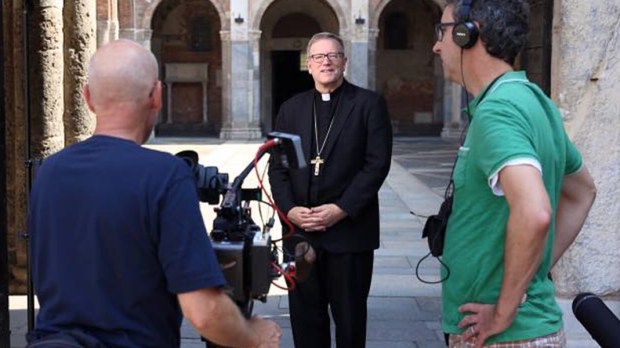As I read Bishop Robert Barron’s new book, my mind kept going back to a conversation I had with faculty, students and staff of Benedictine College. As we barreled down the Interstate in a van on the way to a conference, someone asked: What does accompaniment mean?
Pope Francis is constantly saying to “accompany” people. But what if the lifestyle of those you are accompanying is leading them off a cliff? Do you walk to the cliff with them? At what point do you cut them loose? And shouldn’t you be warning them away from the cliff instead of accompanying them to it?
The question was real: People in the van not only had friends who had turned their back on the faith— but had friends who had reached out to others only to be dragged into the darkness rather than leading the others out to the light.
Enter To Light a Fire on the Earth, the new book by transplanted Chicagoan Bishop Robert Barron of Los Angeles “with” John Allen Jr. (the book is actually Allen reporting the thought of Barron, using a number of sources including extensive interviews).
The book is part biography and part apologetics manual on topics from the Bible to modern controversies. It also, incidentally, answers my van’s burning question about accompaniment.
First, to “accompany,” you need to see the state of the Church as an opportunity instead of a disaster.
Barron is very much aware of the crisis in the Church — the massive numbers who have left the faith and the small trickle that is entering it. “No other religious group in the country had such a lopsided ratio of losses to gains,” he says.
But he also sees something more: the people who have left the faith are not in a thriving, vigorous new belief system. They left a Church they did not understand for an alternative — secularism — that is failing them.
Their new scientistic worldview “imperils poetry and art, for instance, as much as religion” he says, and many people are “chafing against it, they’re reacting against it. That’s an opening.”
Secularism doesn’t just disappoint people — it imperils them. “When you suppress the desire for God, which secularism does necessarily, it’s very dangerous psychologically,” Barron says. “I see it all the time in the form of addictions and depressions. So, I’m doing this out of deep concern for people. It’s dangerous stuff, to shut down the aspiration toward God.”
So that’s the first thing a would-be evangelist needs to know: We truly have something to offer.
Second, don’t sell short the people you accompany.
Barron calls the weak faith expressions of the late 20th century “beige Catholicism.” “After Vatican II, we threw away all of our apologetic weapons” he said, and developed “a sort of romanticism about simple language” and “aversion to highfalutin concepts. “
That approach failed — especially after 9/11, when forceful critics linked all religion to violence. Barron says Catholics realized “Man, we need highfalutin concepts right now. We need counterarguments. … The banners and balloons way was not up to the task.”
Barron practices what he preaches, teaching the faith in a way that is down to earth, not dumbed down. He insists that if kids can memorize Star Wars characters, they can learn the Bible, too, and for adults he references Dante and Clint Eastwood, the Chartres Cathedral and baseball, John Henry Newman and Bob Dylan.
Third, he says, skip naval gazing and stare at the face of Christ instead.
Catholics spend too much time in internecine fights about Church rules and not enough time focused on the one who gives meaning to those rules, says Barron.
“When you talk to the younger generation about Church and political machinations, and jockeying for office, they’re bored, but what turns them on is, ‘Yes, tell me the story of Maximilian Kolbe again!’”
Or, better, the story of Jesus Christ.
Barron began his priesthood as a scholar focused on the priority of Christ, and has proceeded as a preacher who sees the Incarnate Son of God as the only answer to our “Christ-haunted” culture.
Writes Allen: “Only when you’ve had that experience of falling in love with something, Barron believes, will learning the rules that support it make sense.”
In fact, the book lays out Barron’s case for making his Word on Fire apostolate of YouTube videos, podcasts and DVD offerings into a Christ-centered movement whose spirituality would begin from the Beatitudes and be fed by Eucharistic adoration.
In short, Barron says only “affirmative orthodoxy” is capable of accompanying others.
Barron is a critic not just of “beige Catholicism” but also of the “culture war” approach that sees those who have been misinformed or under-nourished spiritually as enemies to be defeated instead of victims who need help.
“Instead of condemning the unevangelized” he would rather “relate with joyous verve, and extend an invitation to receive all of Christ’s gifts through his Church.”
Which is exactly what it means to “accompany” others.

